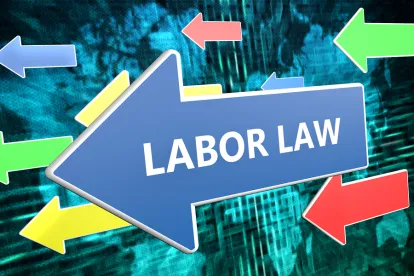The National Labor Relations Board (NLRB) implemented several parts of its new election rule that were not enjoined by a federal district court judge.
The new rule aims to reform the controversial Obama-era “quickie election” regulations. The entire rule was scheduled to go into effect on May 31, but its implementation fell into question after U.S. District Court Judge Ketanji Brown Jackson enjoined parts of the rule that, in the court’s view, were not lawfully promulgated. AFL-CIO v. NLRB, No. 20-CV-0675 (D. D.C. May 30, 2020). (The judge issued a more extensive decision on June 7.) Rather than shelve the entire rule pending an appeal of the Judge’s ruling, the NLRB implemented the unaffected parts. These include: (1) scheduling the initial hearing date at least 14 business days (rather than eight calendar days) from issuance of the Notice of Hearing; (2) posting the Notice of Petition within five business days (rather than two calendar days) after service of the Notice of Hearing; (3) filing the employer’s Statement of Position within eight business days (rather than seven calendar days) after service of the Notice of Hearing; (4) providing a Statement of Position to be filed by the Petitioner in response to the issues raised in any Statement of Position; (5) allowing the parties to file post-hearing briefs; and (6) establishing ballot impoundment procedures when a request for review (appeal) is filed within 10 business days after the day an election is directed and is pending on the date the election is held. Among the reforms the court decided would not go into effect on May 31 are: (1) expansion of the right to pre-election litigation of voter inclusion and eligibility issues; (2) increase time prior to an election for communication with employees about election issues; (3) increase time for employers to furnish a list of eligible voters to the union and NLRB Regional Office; (4) limit who may serve as election observers (only bargaining unit members); and (5) delay of election certification where an appeal is pending.
Resuming election proceedings halted by the COVID-19 pandemic, the NLRB lifted its stay of an election and ordered a mail, rather than manual, ballot election.
Atlas Pacific Engineering Company, 27-RC-258742 (May 8, 2020). A Regional Director (RD) had ordered a mail ballot election over the employer’s objection, leading the employer to file an Emergency Motion to Stay the Election with the NLRB. The NLRB granted the employer’s motion and stayed the election, “to allow the Board time to fully consider the issues presented by the Regional Director’s direction of a mail ballot election.” Atlas Pacific Engineering Company, 27-RC-258742 (May 1, 2020). The employer also had filed a Request for Review (appeal) of the RD’s decision. In its May 8 decision lifting the stay and ordering a mail ballot election, the NLRB held that, although manual ballot elections normally are preferred, “there may be other relevant factors that the Regional Director may consider in making this decision” and “extraordinary circumstances” permitted the RD to exercise her discretion to depart from the NLRB’s manual ballot default position. While the RD’s main concern about conducting a manual ballot election was NLRB employees’ safety, the NLRB relied “on the extraordinary federal, state, and local government directives that have limited nonessential travel, required the closure of nonessential businesses, and resulted in a determination that the regional office charged with conducting this election should remain on mandatory telework” and found the RD did not abuse her discretion in ordering a mail ballot election. Since the Atlas Pacific decision, several other RDs have ordered and conducted mail ballot elections over the employers’ objections.
The NLRB ruled that election ballots with markings (“dual-marked”) in more than one box will be void and not counted in election tallies.
Providence Health & Services-Oregon d/b/a Providence Portland Medical Center, 369 NLRB No. 78 (May 13, 2020). In NLRB elections, the standard NLRB ballot instructs voters to place an “X” in one box to indicate a NO vote (against union representation) and in another box to indicate a YES vote (in favor of union representation). The NLRB held that “where a ballot includes markings in more than one square” or in the rectangle around the YES or NO boxes, the ballot “is void.” Under NLRB precedent, the NLRB attempted to determine the intention of the voter when a ballot contained one or more stray marks. If the NLRB could not, the ballot was deemed void. The new approach, the NLRB held, will provide a “clear, objective standard that will avoid the litigation that has accompanied the Board’s prior approach to dual-marked ballots.” The NLRB applied its new standard retroactively, and it also revised its official ballot language to warn voters against making more than one mark on the ballot, consistent with the decision.
The NLRB held that a case-by-case analysis is required to determine whether employers can lawfully maintain confidentiality rules prohibiting employees from disclosing employee names and contact information.
Interstate Management Company, LLC, 369 NLRB No. 84 (May 20, 2020). The employer, a large multistate hotel operator, maintained a confidentiality rule stating (in relevant part), “[e]very associate is responsible for utilizing the Company’s information solely for authorized business purposes. In addition, every associate is responsible for protecting the Company’s confidential information and information systems from unauthorized internal and external access.” The rule defined “confidential information” as including “personal information, which is defined broadly to include any information that can be associated with or traced to any individual, such as an individual’s name, address, telephone number, e-mail address ….” An employee organization filed an unfair labor practice (ULP) charge alleging the rule was unlawfully overbroad. However, contrary to the fate of many confidentiality rules, the NLRB did not designate the rule as a “Category 3” (unlawful) rule under Boeing Co. [365 NLRB No. 154 (2017)]. Instead, it designated the rule as a “Category 2” rule, meaning it was not possible to draw conclusions about the lawfulness of the rule generally and, instead, the NLRB must examine the competing rights and interests specific to that rule and that employer. Performing that analysis, the NLRB found the employer’s interest as a multistate employer in protecting the information of its 30,000 employees outweighed any potential burden on employees’ rights protected by the National Labor Relations Act (NLRA).
Even as the NLRB reported a lower caseload due to the COVID-19 pandemic, workers began filing ULP charges concerning work conditions relating to the pandemic.
Speaking at a May 12 virtual meeting of the U.S. Chamber of Commerce, the NLRB’s General Counsel (GC) reported that the NLRB’s caseload was down 44 percent from March to April, a change the GC largely attributed to the impact of the pandemic. While experiencing a drop in the number of ULP charges filed, the NLRB has received some novel charges, filed by employees and unions alleging employers’ NLRA violations relating to the pandemic. Bloombergreported on a Colorado tea shop against which an ULP charge was filed. The employer allegedly terminated workers who refused to return to work because of concerns over the pandemic. The report also discussed a poultry processing plant in Delaware that received a charge alleging management forced employees to attend non-socially distanced anti-union meetings and garnished employee wages to pay for their personal protective equipment.









 />i
/>i
